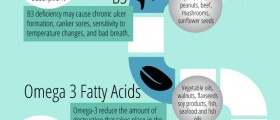
Dietary minerals which are also sometimes referred to as mineral nutrients are certain chemical elements which all living organisms require in order to survive, excluding oxygen, nitrogen, hydrogen and carbon. There are certain types of bacteria which help in the breakdown of minerals so that they can be absorbed much more easily. There are a large number of people in the United States which do not rely on their everyday diets when it comes to ingest recommended amounts of nutrients so they rely on taking various vitamins and minerals in the form of supplements. These supplements are completely safe as there are no serious cases of poisoning or death reported due to the utilization of those.
Essential Chemical Elements
According to numerous different scientific sources, there are sixteen chemical elements required for all the biochemical processes in the human body. Most dietary elements are characterized by a fairly low atomic weight. As already mentioned the four organic basic elements include carbon, hydrogen, nitrogen and oxygen. There are also seven quantity elements and those are sodium, magnesium, phosphorus, sulfur, chlorine, potassium and calcium. There are also nine essential trace elements and those include manganese, iron, cobalt, nickel, copper, zinc, selenium, molybdenum and iodine. There are also three more chemical elements which are considered as pervasive, but there are no identified biological functions of these elements in humans. Those three elements are boron, fluorine and silicon. The daily requirements of sodium are 1500 milligrams. It is a systemic electrolyte and it can be found in spinach, milk, sea vegetables and table salt. Sodium insufficiency leads to the development of hyponatremia, while excessive amounts of sodium may lead to the development of a medical condition called hypernatremia. The daily requirements of magnesium are 420 milligrams. Magnesium is excellent for the overall health of the bones and the best natural sources of it include cocoa mass, soy beans and nuts. Mangesium deficiency leads to the development of hypomagnesemia, while excess amounts may lead to the development of hypermagnesemia. The daily requirements of phosphorus are 700 milligrams. It is very important for the processing of energy. Phosphorus deficiency leads to the development of hypophosphatemia, while excessive amounts may lead to the medical condition known as hyperphosphatemia. Sulfur is definitely required by large quantities and it can be obtained in any type of diet which contains plenty of proteins. The daily requirements of potassium are 4700 milligrams. It is one of the systemic electrolytes and it can be obtained from bananas, tomatoes, potato skin and legumes. Potassium deficiency leads to the development of hypokalemia, while excessive amounts of it may be associated with hyperkalemia. The daily requirements of chlorine are 2300 milligrams. It is of utmost importance for the production of hydrochloric acid. The main source of chlorine is table salt. Insufficient amounts of chlorine may lead to the development of hypochloremia, while excessive amounts may be associated with the medical condition known as hyperchloremia. Daily requirements of calcium are 1300 milligrams. It is of utmost importance for the overall health of blood, bones, digestive system, heart and muscles. The best sources of calcium include seeds, nuts, green leafy vegetables, sardines, salmon and dairy products. Insufficient amounts of calcium lead to hypocalcemia, while excessive amounts may lead to the development of hyperkalcemia. Daily requirements for manganese are 2.3 milligrams. It is important for various enzyme functions. Daily requirements for iron are 18 milligrams. The best sources of iron include enriched grains, whole grains, beans, dried fruits, eggs, salmon, tuna, leafy green vegetables and red meat. Iron deficiency may lead to anemia while excessive amounts of iron may lead to the development of iron overload disorder. Cobalt is very important for the synthesis of vitamin B12. Daily requirements for copper are 900 micrograms. It is of utmost importance for various enzyme functions. Daily requirements for zinc are 11 milligrams. Daily requirements for selenium are 55 micrograms. Excessive amounts of selenium may lead to the development of a medical condition called Selenosis. The daily requirements for molybdenum are 45 micrograms, while the daily requirements for iodine are 150 micrograms.
Dietary Nutrition
It is a widely known fact that all dietary supplements should be ingested by consuming a wide variety of different food items. Some elements may be naturally present while certain others need to be added to the food. One can also try using various different types of dietary supplements in order to obtain the proper and recommended amounts of precious nutrients. Proper and well balanced diet which contains the right amounts of precious nutrients is very important for the overall health of each and every human being.
Mineral Ecology
All living organisms are connected to the minerals on the planet and the magnitude of mineral biogeoengineering has grown significantly in the recent years. Minerals are inorganic in nature but they get recycled by bacteria and get freely suspended in the waters of the world.

















Your thoughts on this
Loading...